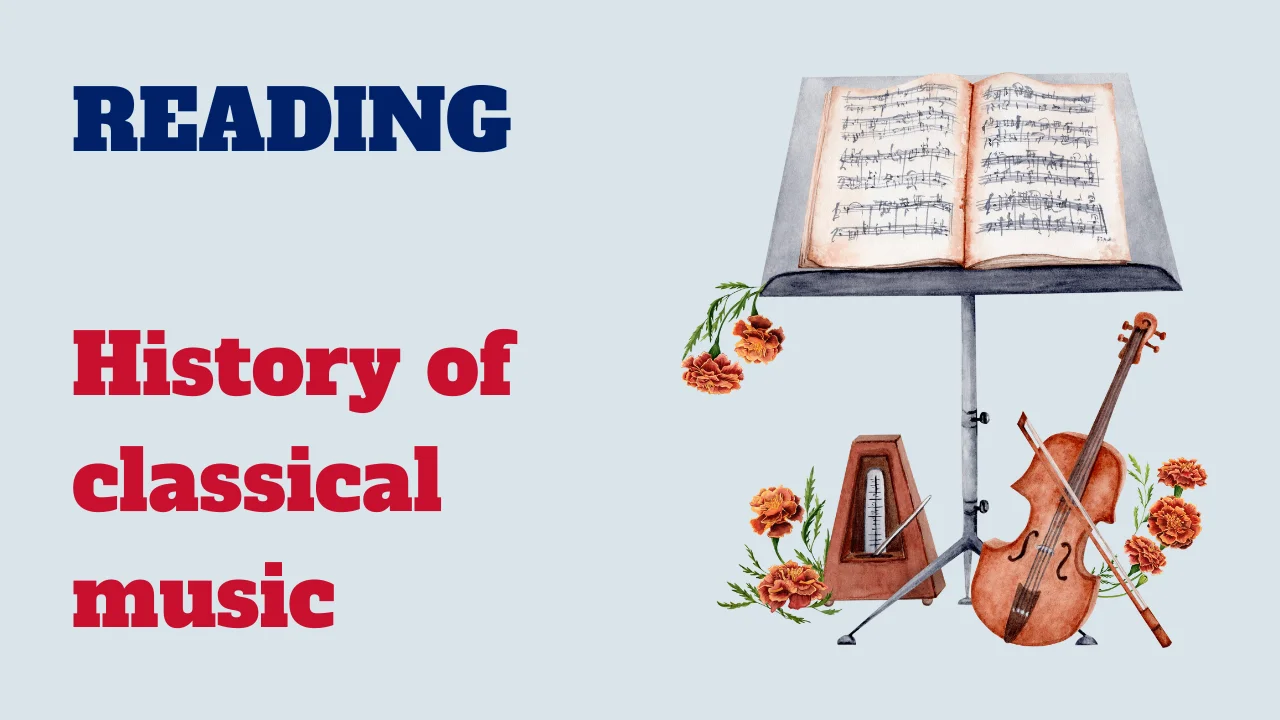In this reading activity, we’ll discover the Western classical music tradition’s deep roots, with its origins intertwined with the early Christian Church.

This reading explores the history of classical music, tracing its evolution from ancient civilizations to the Middle Ages.
Text: History of classical music
Classical music, a vast tapestry woven over centuries, boasts a rich history brimming with innovation and artistic genius. Its roots trace back to the liturgical music of the medieval church, characterized by Gregorian chants – a single melodic line sung without accompaniment.
The Renaissance (14th-16th centuries) ushered in a new era of polyphony, where multiple independent melodies intertwined to create a richer soundscape. Composers like Palestrina and Dufay explored harmony, counterpoint, and vocal techniques, laying the groundwork for future developments.
The Baroque period (17th-mid 18th centuries) witnessed the rise of musical giants like Bach, Handel, and Vivaldi. This era is celebrated for its grandeur, complex structures, and the birth of the orchestra as we know it. Instrumental music flourished, with concertos showcasing the virtuosity of soloists, and fugues demonstrating the art of weaving intricate melodies together.
The Classical period (mid-18th century-early 19th century) brought a shift towards clarity, balance, and elegance. Composers like Haydn, Mozart, and Beethoven refined musical forms like the symphony and sonata, creating works known for their emotional depth and structural precision. This period also saw the rise of the piano as a prominent solo instrument.
Romanticism (early 19th century-mid 19th century) marked a return to emotional expression and individuality. Composers like Chopin, Tchaikovsky, and Berlioz broke away from the rigid structures of the Classical period, embracing personal narratives, dramatic themes, and program music that evoked specific emotions or stories.
The 20th century witnessed a further diversification of classical music. From the atonal experiments of Schoenberg to the minimalist compositions of Glass, composers continued to push boundaries and explore new sonic territories. Today, classical music thrives in a globalized world, incorporating influences from various cultures and blurring the lines between genres.
Classical music’s impact extends far beyond the concert hall. It has served as a source of inspiration for countless artists across different disciplines and continues to shape our understanding of beauty, emotion, and the human experience. Its rich history offers a treasure trove for exploration, waiting to be discovered by music lovers of all generations.
Comprehension questions
The history of classical music is a rich tapestry woven from various cultural influences, from ancient Greece and Rome to the early Christian Church. Despite the challenges of misinterpretation and misunderstanding, the legacy of ancient musical traditions continues to resonate in Western classical music today.



